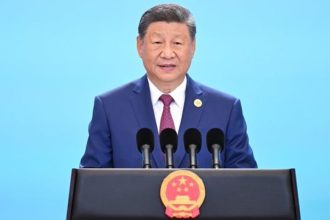U.S. Commerce Secretary Howard Lutnick announced that smartphones, computers, and other electronics, recently exempted from steep reciprocal tariffs on Chinese imports, will face separate duties within two months. Semiconductors and pharmaceuticals will also see targeted levies, signalling a shift in President Donald Trump’s trade strategy.
Speaking on ABC’s This Week, Lutnick revealed that these products will fall under a “special focus” tariff, distinct from the 125% reciprocal tariffs imposed on Chinese imports this week. He emphasized national security, stating the levies aim to boost U.S. production. The announcement follows Friday’s exemption of 20 tech product categories, including laptops and memory chips, which benefited companies like Apple and Dell.
When asked if he has spoken to his Chinese counterpart on tariffs, Commerce Sec. Howard Lutnick says there's been “soft entrees through intermediaries.”
“We all expect that the president of the United States and President Xi of China will work this out.” https://t.co/Z8sg0d32D8 pic.twitter.com/pt8aqGHXzv
— This Week (@ThisWeekABC) April 13, 2025Economic and Global Impact
Trump’s tariff policies, launched on April 2, have sparked a trade war with China, which retaliated with 125% tariffs on U.S. goods. The S&P 500 has dropped over 10% since January 20, reflecting market volatility. Critics, including Senator Elizabeth Warren, call the approach chaotic and warn of inflation risks. Billionaire Ray Dalio expressed concerns about the recession on NBC’s Meet the Press.
Q: "How concerned are you about what's happening to the U.S. Dollar?"
Lutnick: "I am not. I am not concerned about it. We are focused on our tariff policy. We are focused." pic.twitter.com/pgQZnqPW2k
— The Bulwark (@BulwarkOnline) April 13, 2025Investor Bill Ackman suggested a 90-day tariff pause to ease business disruptions, while White House adviser Peter Navarro noted ongoing trade talks with several nations, excluding China. China’s Commerce Ministry is assessing the impact of the exemptions, maintaining that trade disputes require cooperative resolution.
Read: Trump Orders Military Control of US-Mexico Border Strip for Migrant Detention
The new tariffs could reshape global supply chains and consumer prices. As U.S.-China tensions escalate, businesses and policymakers face pressure to balance economic growth with national interests.






